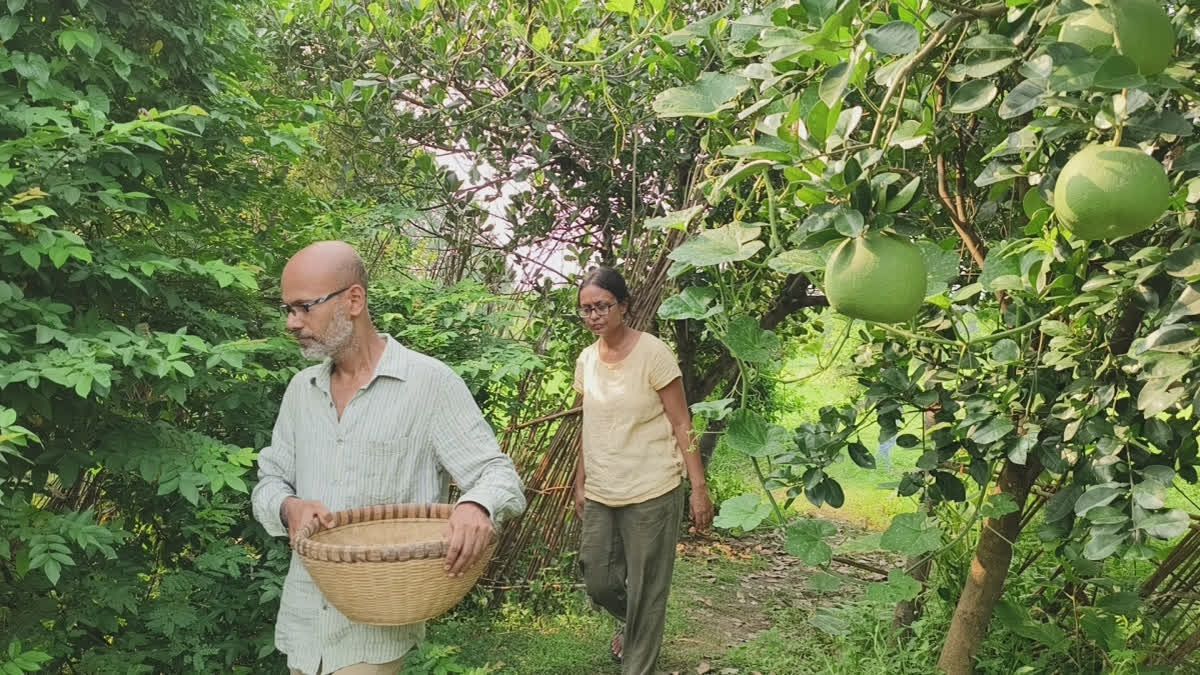Bolpur: A couple from West Bengal, who had once chased the 'American dream' and landed in Kentucky, the northern hemisphere paradise, decades ago finally got a calling of their heart and returned to roots.
Debal Majumder and Aparajita Sengupta's eventually left the luxurious life in the USA and returned to a rural Bolpur village in the Birbhum district. The lure of fast life as an engineer in a multinational company was never an impediment for Debal to bid adieu to the fast life of the USA. He along with his wife Aparajita, a professor teaching at a university in a US city, instead pursued their hearts and invest energy in something which is not associated with their profession. They wanted to find the answer to something more fundamental and rooted in human existence and sustainable living.
One fine day, the couple left their dream job, packed bags and left for their home state without looking back. Upon returning to Bolpur, they purchased land and set up natural farming. Not only do they grow vegetables themselves, but they also impart training on natural farming to villagers helping them earn a sustainable livelihood.
"We did extensive research is all about how pure the yield is in natural farming, as well as why there are fewer women farmers in an agriculturally dominant country like India. Interested students from nook and corner of the country and abroad also come to get trained in Rooppur village near Santiniketan in their mud houses, farmlands, and ponds.
Debal, a resident of the Burdwan district, completed engineering from Jadavpur University and secured a job at a multinational company in Kentucky, USA. Aparajita, who is from Kolkata, completed her graduation and post-graduation from Presidency and Calcutta University and earned her PhD degree from Kentucky University in America in English Literature. Later, she also began teaching in the US.
The quest of the couple began while they were in the USA. "We used to wonder why the taste of the food differs. Is it because of adulteration? What's the extent of adulteration? I along with my wife Aparajita began to realise the problems by visiting several villages in the USA. Finally, we got a calling of our heart and decided to return to our native place and do something for our own people," Debal said.
They bought five-and-a-half bighas of land with a pond at Ruppur village near Santiniketan from the money saved from jobs and started research on farming. In the meantime, they both did a pharma culture course. "If the crop is produced with the use of chemical fertilisers, its taste, and quality varies a lot. In addition, the use of pesticides harms the human body. Besides, the number of women farmers is less in agriculturally dominant countries like India. We found that women should take part in farming. They do not have land in their names and are not recognised as cultivators. We wanted to help them attain self-sufficiency," Aparajita said.
Interested people from various parts of India and also from Bangladesh, America, France, and Sweden participated in the training and hands-on research courses related to natural farming at their home in Santiniketan.
Gradually, they found takers of their 'model' from Nepal, Bangladesh, and America. They received invites from agricultural institutes to attend seminars in India as honorary professors to teach pharma culture. However, they continue to live in a house made of mud and wood. At present seven types of desi paddy, wheat, different types of lemon, mango, guava and several fruits are cultivated at their farm.
Also, they encourage rural people to rear fish and run poultry businesses for their self-sustenance. They consume the produce themselves, besides making jam and jelly which they sell off to eke out a living for themselves. The couple and their daughter survive on selling surplus crops.
The couple's effort has earned accolades across and outside the county. Their torch-bearing efforts are now encouraging thousands of ruralites in West Bengal. "Gradually, the world is waking up to the dangers of food contamination. In times of talks about carbon emissions, and global efforts to promote sustainable living, we understand that individuals must attempt to do something of their own. A baby step today can encourage us to walk the extra mile, so we want to start on our own without waiting for others to do," Debal said.
Aparajita, who played a perfect housewife and companion to Debal in his pursuit, said "We started thinking about local food when in America. Then we decided to come back. We learn to make mistakes every moment and teach others. That's how our days pass off."



